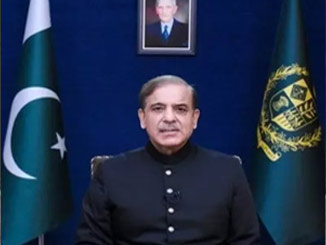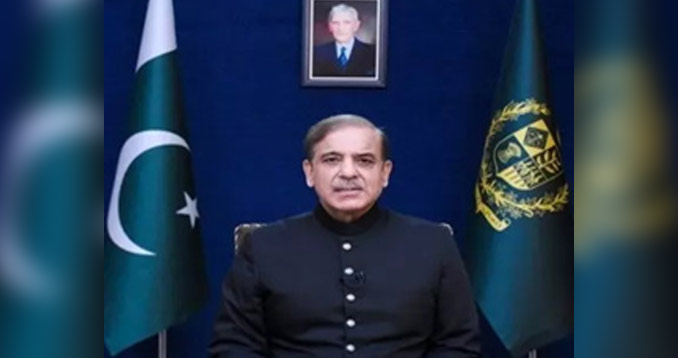

Pakistan Prime Minister Shehbaz Sharif has expressed his desire for peaceful relations with India based on the principles of “equity, justice and mutual respect” and the resolution of the Kashmir issue as the two countries almost faced war.
The Indian air force in a statement said a formal inquiry found that “deviation from the Standard Operating Procedures by three officers led to the accidental firing of the missile” into Pakistan.”These three officers have primarily been held responsible for the incident. Their services have been terminated by the Central Govt with immediate effect,” the statement said.
The BrahMos cruise missile was fired from India on March 9. It landed in Pakistan’s eastern Punjab province, roughly 125 kilometers (78 miles) inside Pakistani territory, damaging a wall in a residential area. No casualties or injuries were reported.
Two days after the launch, India’s defense ministry acknowledged the mistake, saying that the firing was caused by a “technical malfunction” during routine maintenance. The ministry called the incident “deeply regrettable.”
India and Pakistan have fought three wars since the two country’s independence from the British Empire in 1947. Both Islamabad and New Delhi lay claim to the entire territory of the disputed Himalayan region of Kashmir.
In 2019, Pakistan’s air force shot down an Indian aircraft in a Pakistani-administered area of Kashmir and captured a pilot, who was later released. Earlier, an Indian warplane carried out an airstrike allegedly targeting militants in the town of Balakot in Pakistan’s northwestern region of Kyber-Pakhtunkhwa. The town lies immediately west of Pakistani-administered Kashmir.
Sharif urged the international community to play a “facilitative role” to ensure durable peace and stability in South Asia, it said, amidst a chill in bilateral ties over the Kashmir issue and cross border terrorism emanating from Pakistan.
Sharif expressed these views during a meeting with the newly-appointed Australian High Commissioner to Pakistan, Neil Hawkins, the Dawn Newspaper quoted the Prime Minister’s Office (PMO) as saying. “The international community has to play a facilitative role in this regard, as it was essential for durable peace and stability in South Asia,” he said.
India has repeatedly told Pakistan that it desires normal neighbourly relations with Islamabad in an environment free of terror, hostility, and violence. India has said the onus is on Pakistan to create an environment free of terror and hostility.
The bilateral ties deteriorated further after India announced withdrawing the special powers of Jammu and Kashmir and bifurcation of the state into two union territories in August 2019.
India has repeatedly told Pakistan that Jammu and Kashmir “was, is and shall forever” remain an integral part of the country. It also advised Pakistan to accept the reality and stop all anti-India propaganda.
Since Pakistan’s founding 75 years ago, the nuclear-armed nation has been plagued by political volatility and military coups. Even in the calmest of times, the country’s military establishment has been the invisible hand guiding electoral politics, ushering its allies into positions of power and pushing away rivals.
The last prime minister to be driven from office before Imrian Khan, Nawaz Sharif — the older brother of the current prime minister — was disqualified from holding office in 2017 over corruption charges in a controversial verdict by the Supreme Court. The elder Sharif sought refuge in London, joining a long line of political figures effectively exiled from Pakistan under the threat of criminal charges.
In an echo of that political script, former Prime Mininster Imran Khan was charged under Pakistan’s antiterrorism act after giving a speech to thousands of supporters in the capital, Islamabad, in which he threatened legal action against senior police officers and a judge involved in the recent arrest of one of his top aides.
The charges intensified the showdown between the government and Khan, and added to a wave of reports of harassment, arrest and intimidation aimed at journalists and allies of Khan in recent weeks that many view as a coordinated effort by the authorities to dampen his political prospects.
The Pakistani military denies accusations that it is behind the recent crackdown against Khan’s supporters and the news media. It said that the institution had adopted a “neutral” position and remains apolitical. And military officials have stressed that the army has nothing to do with police cases and the civilian courts.
“Don’t drag the military into politics,” Maj. Gen. Babar Iftikhar, the army spokesman, said recently, stressing that the military has taken a position of not favoring any political faction.
In any case, the crackdown appears to have heightened Khan’s popularity, analysts say, bolstering his claims that the military establishment conspired to topple his government in April.
“What differentiates this moment from previous moments is the amount of sheer street power Khan has,” said Madiha Afzal, a fellow at the Brookings Institution. “And street power makes a difference in Pakistan even when it does not translate into electoral votes.”
In recent months, Khan has regularly drawn tens of thousands of supporters onto the streets, where he has lashed out at the current government and the military. The overwhelming public support has buoyed his hopes for a political comeback, and he has demanded new elections, refusing political dialogue with his rivals.
The crackdown on Khan and his supporters has intensified frustrations among young, social-media-savvy Pakistanis and the older generation alike over the entrenched corruption and all-powerful hand of the military in the country’s political system.
“First, they ousted him from the premiership, and now want to arrest him, ban his speeches at TV channels, and harass his team members,” said Sharafat Ali, a university student sitting with his friends at a cafe in the country’s economic hub, Karachi. “But such fascist actions cannot deter the country’s people, particularly youth, from supporting Khan.”
As both countries mark 75 years of independence, they both face political and economic instability. Any prospect of war between two countries is not politically or economically desirable.

Leave a Reply